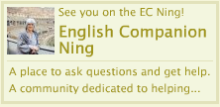Connecticut had an average of over nine inches of rain this June, a mixed blessing. The cool temperatures and constant downpours had a direct impact on the dress code, and the beach attire favored by high school females (and appreciated by young high school males) was not a distraction. Furthermore, the temperatures in the classroom were cool, and the dark skies meant that lighting in the classroom was ideal for showing films to wrap up the year.
The weather, however, did dampen opportunities to teach one of my favorite poems by William Wordsworth, The Tables Turned. The poem is a plea to the reader to throw down the books with poems that try to capture nature, the art that mimics nature, or the science that tries to explain nature:
The Tables Turned
AN EVENING SCENE ON THE SAME SUBJECT (1798)
Up! up! my Friend, and quit your books;
Or surely you’ll grow double:
Up! up! my Friend, and clear your looks;
Why all this toil and trouble?The sun above the mountain’s head,
A freshening lustre mellow
Through all the long green fields has spread,
His first sweet evening yellow.Books! ’tis a dull and endless strife:
Come, hear the woodland linnet,
How sweet his music! on my life,
There’s more of wisdom in it.And hark! how blithe the throstle sings!
He, too, is no mean preacher:
Come forth into the light of things,
Let Nature be your teacher.She has a world of ready wealth,
Our minds and hearts to bless—
Spontaneous wisdom breathed by health,
Truth breathed by cheerfulness.One impulse from a vernal wood
May teach you more of man,
Of moral evil and of good,
Than all the sages can.Sweet is the lore which Nature brings;
Our meddling intellect
Mis-shapes the beauteous forms of things:—
We murder to dissect.Enough of Science and of Art;
Close up those barren leaves;
Come forth, and bring with you a heart
That watches and receives.
When I teach the poem, I do what is now called “close reading”, a strategy favored by the Common Core State Standards, by having students pay attention to particular images, text structure, and word choice in order to determine an author’s purpose. The process can be a bit tedious, but in this case, I want them to feel a little hostile about “dissecting” the poem.
“What does the poem mean?” I will press them, “What is Wordworth’s purpose?”
“Nature is good?” (Maybe)
“Poems can make us appreciate nature?” (Perhaps)
“We cannot capture Nature in books?” (Possibly)
“We should ditch our books and go outside?” Absolutely!
And to the delight of everyone, I instruct my students to close up their books and go outside so that we can “let Nature be your Teacher”. That is the entire lesson. A poem, an analysis, and a trip outdoors that obeys the author’s intent.
Hopefully, next June will give us the day when the “sun above the mountain’s head/A freshening lustre mellow” lets us upend the tables and go outside to engage with Nature in order to “watch and receive” and leave close reading overturned.






Love this fresh take on Close Reading! Can’t wait to share it with teachers the next time I do PD!
Now that’s a class I would surely love to be a part of! 🙂 Sounds very exciting. Wordsworth has a point – often we bury our noses in books, forgetting the equally beautiful world outside.
Good lesson that Close Readings can have positive payoffs!
Fabulous!
What a wonderful lesson!
Thanks for sharing this poem/lesson with us!
“Come forth into the light of things,
Let Nature be your teacher.” — sounds like they might need more than one day outside!
Wow–powerful message from the poem and from you on how close reading has its place and limits. I will definitely revisit this post and poem.